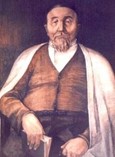
Tanibergenov Arip is a national poet, enlightener, one of the talented students of Abay.
In the XIX century, akyn schools formed in Kazakhstan, in our region there was a poetry school of Abai. Thanks to this school, the talent of our fellow countryman Arip Tanibergenov, a true national poet, and enlightener, one of the most talented students of Abai Kunanbayev was developed.
Tanirbergenov (Mukhamedgarip) Arip was born in Zhylandy, Zharma district, Semipalatinsk region (now East Kazakhstan region). Arip is a native of a poor family, in his youth, at the choice of the local volost governor he ended up in a Russian missionary school in Semipalatinsk. At the same time as the Russian school, he attended a Muslim school – madrassas. While studying in the city, he met Abai Kunanbayev. In 1878 he graduated from the Semipalatinsk district school. As a result, he acquired a solid Russian education, emphasized knowledge of the oral and poetic work of the Kazakh people, and studied the oriental classics. Having sufficient knowledge of native and Russian languages, Arip at the same time could read literature in Tatar, Arabic and Persian, studied Chinese. In the 80s, he served as a translator in various administrative and educational institutions, at the Russian consulate in Chuguchak, China.
As a teenager he began to participate in Aitys, where he won several victories. His rivals in poetic competitions were such akyns as Kokbai, Aset, Sadir, Boranbai, Kaumet and others. In his youth, along with love lyrics, humorous songs, he composed poems on popular stories from “A Thousand and One Nights” and dostans “Khoja Gafan”, “Seiful-Malik”, “Yusuf and Zuleikha”, “Kissa-and Bakhram”. At the same time, the young poet promotes love, brutality, worthiness, dignity of the soul and human responsibilities. The first poem “Ziyada Shakhmurat”, written in 1884, was published in 1890. These poems ignoring their sense of humor, the adventurous adventure of romantic heroes, and the glorification of lofty emotions have been distorted from the reality. Only after the criticisms of these poems by Abai, who indicated the remoteness of the plot from real life, the exaggerated character of the hero, Tanibergenov had to take his own attention to the phenomena of social life. Poet has come back to social problems, to the life of the corrupt dynasty of the Kazakh courtyard. At the end of XIX and at the beginning of the XX century BC his creative work developed in the democratic-prosperous areas of the Kazakh literature. Poems to “Kabanbai”, “Hadzhii Serikbay from Naiman”, “Volost Taurbek” and others describe the work of the kings of the bishops, representing social nonviolence, oppression of the woman.
A great merit of Tanibergenov is his recording of the contest in the verses of the famous masters of the word Birzhan and Sarah. This aitys, which was the most striking example of the skill of a traditional poetic duel and belongs to the treasury of the artistic word, has survived thanks to the poet’s publication.
According to his public views, Tanibergenov was an enlightener. He saw the improvement of the life of the Kazakh people in education, therefore in his works he explains the benefits of science, enlightenment, and calls for striving for knowledge. Following Abai, he tried to acquaint Kazakh readers with the works of A.S. Pushkin and M.Y. Lermontov. Being a tireless enlightener of Russian classical literature, Arip Tanibergenov made a free translation of the novel “Eugene Onegin”, the author of which he dedicated the poem “Genius Pushkin”.
He was actively engaged in educational activities, opened a school for children at home, taught them the Russian language as far as possible, and taught classes by Russian textbooks. Like Abai Kunanbayev, he condemned the simple pastime. He advised his contemporaries to study the verses of Abai. Arip Tanirbergenov compared the world with the ocean, and science with ships, in every way exalted the mind. In his opinion, five qualities correspond to the mind: kindness, honor, shame, patience, precaution.
In poems written for almost half a century, the author touched on various issues of the socio-political and cultural life of his time.
The poet of a democratic orientation of creativity, having lived to see the October Revolution, which found him in his old age, met her with an open mind. In his poems he revealed all social changes and transformations in society. The creativity of this period is enriched ideologically and thematically, political poetry appears in his poetry.
Especially creative for him were 20-21 years. In this short period of time he created poems that reflected his attitude to the events taking place in his words. Of the works on a political theme, his poem “The Commune of Paris”, in which the poet shows the spiritual continuity between the French Communards and the Russian revolutionaries, stands out especially.
His first collection of poems, “Do Not Forget Me,” was published only in 1969.
List of used literature:
- Arip Tanibergenuly / Literature of Kazakhstan: Encyclopedic Handbook. – Almaty: Aruna Publishing House, Kazygurt Publishing House, 2010.- p. 68
- Gainullina F.A. Literature of the Semipalatinsk Irtysh: a training manual. – Semipalatinsk, 2002. – P.26-28
- History of Kazakh literature in 3 vols. T.2 / Ed. I.T. Dyusenbayeva. – Alma-Ata: Science Kaz. SSR. – p. 234-235
- Mukhamedkhanov K. Arip Tanibergenov / Kazakh SSR v.4: short encyclopedia. – Alma-Ata: Head. Ed. of Kaz. Sov. Encyclopedia. – p.128
- Writers and poets of the Semey region: a biobibliographic index / Comp. O.F. Maltseva. – Semey: Publishing House “House of the Press”, 2015. – p.106
- Tanibergenov Arip / Kashlyak V. Semipalatinsk: named after them … – Semipalatinsk, 2006. – p.343
- Zulkharov G. An authentic folk poet // Irtysh. – 1996.- October 8. – p.3